
After the Georges Antheil opera that was my first assignment from La Cieca, I have to confess feeling slightly relieved when I opened the parterre package to find: Billy Budd! And not only a Billy Budd, but one starring John Mark Ainsley! The rest of the cast looked similarly starry (pardon the pun), so I set in.
This 2010 Glyndebourne production is about as current as opera DVDs come. Strange, then, that Michael Grandage’s staging of the work is so ruthlessly traditional. In fact, it seems closer to a historical recreation than a production. “Why is this bad?” you might ask, “Isn’t Billy Budd almost impossible to mess with?” Well, dear reader, yes.
But this Billy Budd has been cleaned up and Disneyfied for public consumption. Grandage’s sluggish direction doesn’t lend any intensity to the opera that hasn’t already been built in by Britten or his librettists. Many of the performances don’t help the matter, but there’s no denying that this is a production that takes few risks and shows very little of the gritty, dirty, violent oppression at the heart of Britten’s masterpiece.
The unit set is a head-on view of the inside of a ship (I don’t know any of these technical terms.. so get off my back): all brown wood and rope. Occasionally, when we are transported to Vere’s quarters, a back wall with frosted glass and slightly-less-brown wallpaper drops into the middle of the stage. That’s all she wrote in terms of set.
I would be more OK with the concept if we were shown the claustrophobia of shipboard slavery, but alas, the set is merely boring. The crew all wear ratty, grey costumes that are a bit too clean, and the officers wear British uniforms that look as if they were lifted from a history book. That’s it. Where’s the blood, gunpowder, dirt, and sweat? The crew seem more like disgruntled employees then men stolen away from their families for indefinite servitude. That’s not to say that this reading of Billy Budd is awful. No, like most regional opera, it’s just fine.
Ainsley, as I have previously stated, is one of my favorite tenors. I was skeptical when I saw that he was attempting Vere (and Peter Grimes at Scala in the Summer of 2012)!, but, knowing what a masterful technician he is, I gave him the benefit of the doubt. He certainly is an absolute marvel in Handel, Mozart, Monteverdi, and the like.
But, unfortunately, he just doesn’t have the right heft, the appropriate Pears-y timbre, or the acting chops to pull off Vere. I’m sorry, JMA, you are totally awesome, and this is very well sung, but it’s dull. His Vere comes off not as a man paralyzed by his own intellect, but as a leader that is cold and aloof. This interpretation seriously hamstrings one of the most enigmatic characters of the opera.
Billy Budd, on the other hand, is not enigmatic. He’s pure, and handsome, and a bit of a simpleton. But he’s not stupid. And that’s exactly how Jacques Imbrailo plays him: as an idiot. It doesn’t help that Jacques’ vibrato is constantly under the pitch, or that his voice is not alluring in the least bit. A Billy should charm the audience (Thomas Allen anyone?), but Jacques’ performance falls a bit into the Siegfried trap. His “Lil’ Abner” of a Billy is almost entirely unlikable.
Speaking of unlikeable! The only singer to turn in an epic performance was Phillip Ens as Claggart. He is a real Schwarzbass, and gives a fully-committed, intense, wicked performance. His voice is a size bigger than the rest of the cast, and, even though his top is thin and leathery, it absolutely works. I would love to hear him sing Orin Blitch in Susannah.
The other major standouts are Iain Paterson as Mr. Redburn and Matthew Rose as Mr. Flint. Both have serious acting chops, along with big, British voices. Iain, in particular, is a technically solid bass-baritone, a bit Terfel-esque, whose voice will only continue to grow with time. His performance is naturalistic and real: he almost saved this production for me. Matthew has the smaller role, but is just as committed, and a perfect Britten singer (does he sing Superintendent Budd in Albert Herring?).
Jeremy White as Dansker is also compelling, although he does bear a striking resemblance to the Coca-Cola Santa Claus. The LSO led by Mark Elder sounds.. like the LSO. Fantastic! Is it his doing? Sure? Honestly, I couldn’t tell, but there seemed to be nothing wrong musically, so he must be at least competent.
Billy Budd is, in my opinion, one of the greatest works of the 20th century. Of course there are highlights in this DVD (Claggart’s aria, the “This is our moment” scena, and the “Don’t like the French” trio), but you’d be much better off watching the Allen/Phillip Langridge/Richard Van Allen 1988 ENO production. There, the singers’ performances raise this work up to Britten’s level.














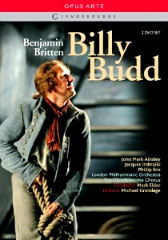
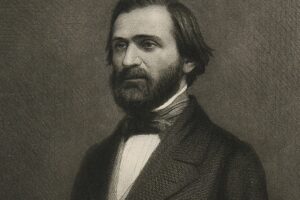
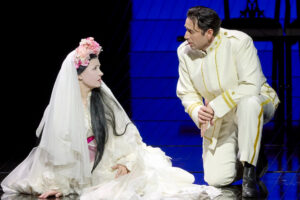
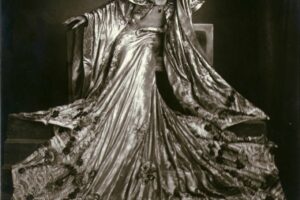
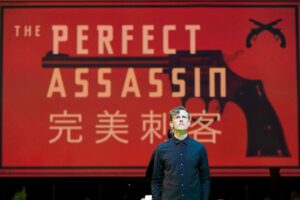






Comments